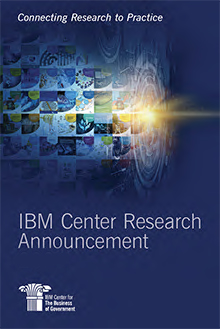This post first appeared on IBM Business of Government. Read the original article.

The Center for The Business of Government continues to support research by recognized thought leaders on key public management issues facing government executives today.
We are pleased to announce our latest round of new reports on key public sector challenges, which respond to priorities identified in the Center’s research agenda. Our content is intended to stimulate and accelerate the production of practical research that benefits public sector leaders and managers.
We expect the following reports to be published in the next year. Short summaries of each report follow, with the last two summarizing work that was begun in 2022 and continues into the next year.
Implementing Enterprise Risk Management: Assessing Agency Readiness by Trang Hoang, University of Nebraska and Peter Young, University of St. Thomas
Efforts to implement Enterprise Risk Management (ERM) in public organizations illuminate several challenges, one of which is “ERM readiness,” ascertaining whether an organization is ready for ERM implementation, what is expected, and how an organization develops a preparatory process for that implementation. Relying on targeted interviews of federal government risk leaders, this report aims to understand how leaders’ perceptions of agency readiness are formed: which includes determining how leaders perceive what ERM guidelines intend and how they translate those perceptions into an implementation plan. The report will provide insights and recommendations to strengthen organizational capacity for ERM implementation in practice.
Actionable Insights in Intergovernmental Grant Programs: Lessons from the Continuum of Care Homeless Assistance Program by Juliet Musso, University of Southern California
This report will illuminate how to improve data sharing and performance management in intergovernmental programs. It will share findings from the Department of Housing and Urban Development (HUD) Continuum of Care (CoC) program to include an in-depth examination of the federal government’s largest discretionary grant program intended to reduce homelessness. The research employs mixed methods to identify HUD’s multi-pronged
strategies that combine performance measures and capacity building supports that focus grant
recipients on achieving national goals. These strategies will provide a menu of smart practices
that can be used by other federal agencies that administer intergovernmental grants.
Use of Food and Drug Administration Advisory Committees in Regulatory Decisionmaking: Providing Insights and Promoting Trust
by C. Joseph Ross Daval, Harvard Medical School and Brigham & Women’s Hospital and Aaron S. Kesselheim, Harvard Medical School
When faced with difficult decisions about new drugs or medical devices, the Food and Drug Administration (FDA) regularly consults with advisory committees of independent experts. Advisory committees provide critical scientific insights and credibility for FDA efficacy and safety determinations. Leveraging data on the frequency, outcomes, and deliberative process of FDA advisory committees, this report will describe the impact of this tool on FDA decision-making. The research will cover the roles expert advisors play in this essential public health agency and develop evidence-based recommendations that policymakers can implement
to make advisory committees optimally useful for the FDA, and the FDA case will serve as. Framework for recommendations about how other agencies can best engage with advisory committees.
Auditing for Equity: How to Effectively Implement and Employ Equity Audits
by Benoy Jacob, University of Wisconsin
This report will offer important lessons to public managers on how to develop, implement, and employ equity audits in their day-to-day operations. Generally speaking, performance audits provide insights into whether public programs are achieving their intended outcomes. As it relates to equity, a performance audit must assess the degree to which program delivery is becoming more equitable and/or leading to more equitable outcomes. The research will
offer an operational guide to public managers that will provide lessons on how to effectively
implement and employ equity audits, and how such tools can help agencies improve outcomes in programs and operations.
Preparing Governments for Future Shocks
by J. Christopher Mihm, The Maxwell School of Citizenship and Public Affairs,
Syracuse University
Shocks are events with severely disruptive consequences. They could be rapid- or slow-onset, or regional or global. While the scope and nature of a particular shock can vary, each requires governments to be prepared to coordinate a response.
Governments need to build a set of core capabilities to be better prepared for the future. Those capabilities can be organized within the following seven strategic domains: renewing investment in emergency preparedness; reinforcing the security imperative and cybersecurity; diversification of supply chain; accelerating the green agenda; upskilling and reskilling talent; Strengthening cross-border coordination; and managing human migration.
Working with the IBM Institute for Business Value and in partnership with the National Academy of Public Administration, we are convening a series of roundtable discussions with global experts from across the public and private sectors to curate and share lessons learned in each of these domains and to identify strategies and solutions for governments to address the challenges that lie ahead.
Addressing the New Era of Deterrence and Warfare: Visualizing the Information Domain
by Institute for the Study of War
In partnership with the Institute for the Study of War, the Center is convening leaders from allied, partnered, and US militaries, governments, academia, and technology sectors to envision and shape future strategic advantages. Highly interactive, moderated discussions will explore how new technologies are changing and complicating warfare. We will investigate ways to visualize multiple domains to aid in rapid, informed decision-making. The final report will capture insights and recommendations that inform decision-makers at the highest levels of allied and US governments.
